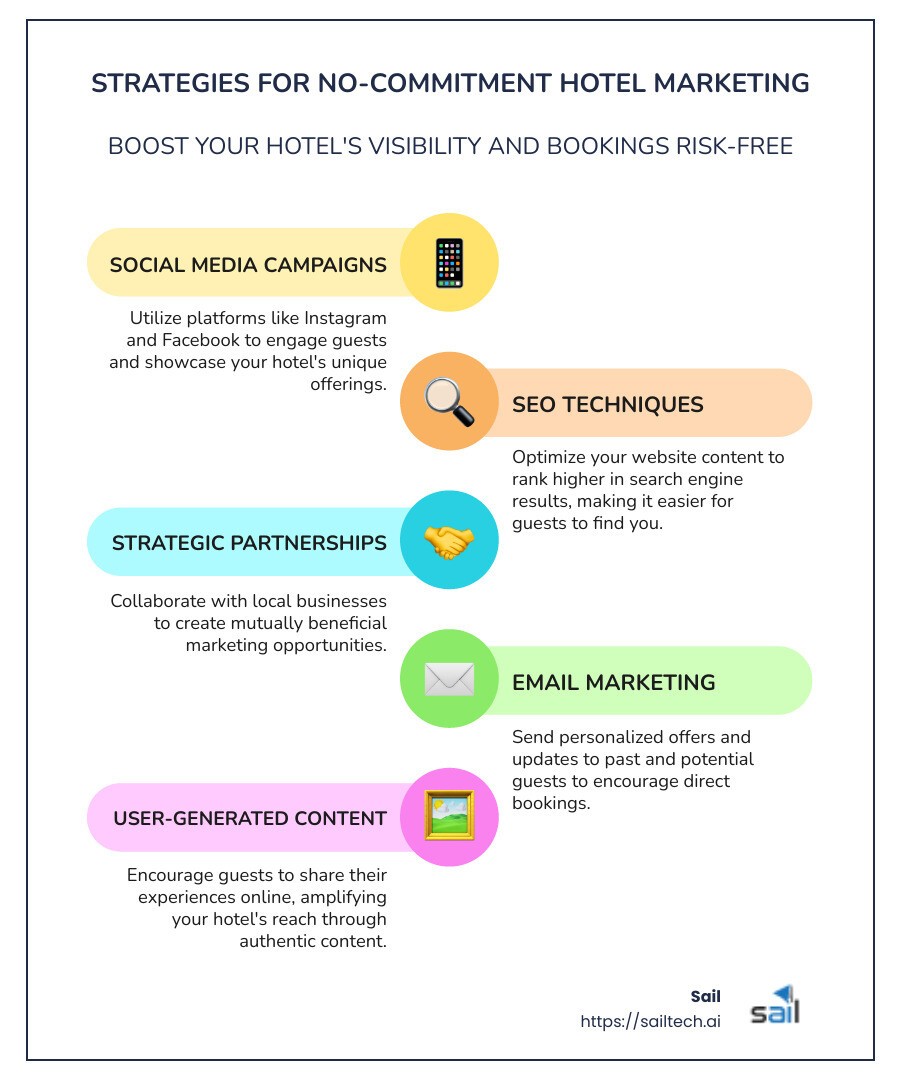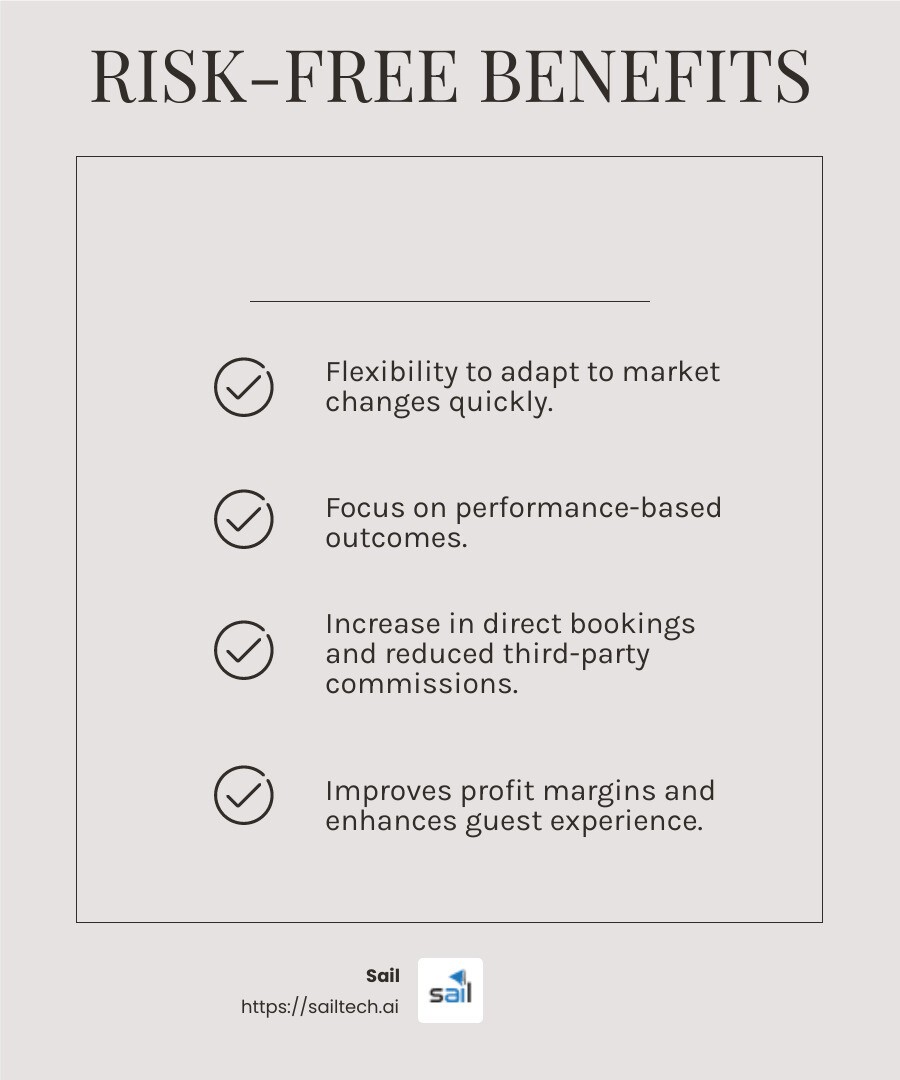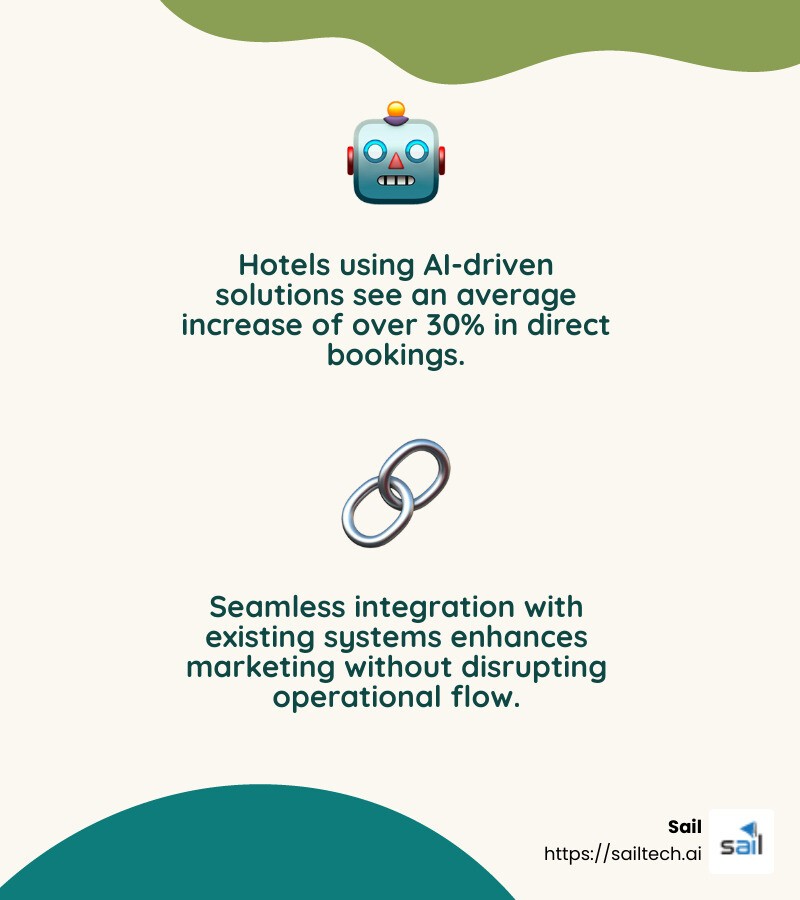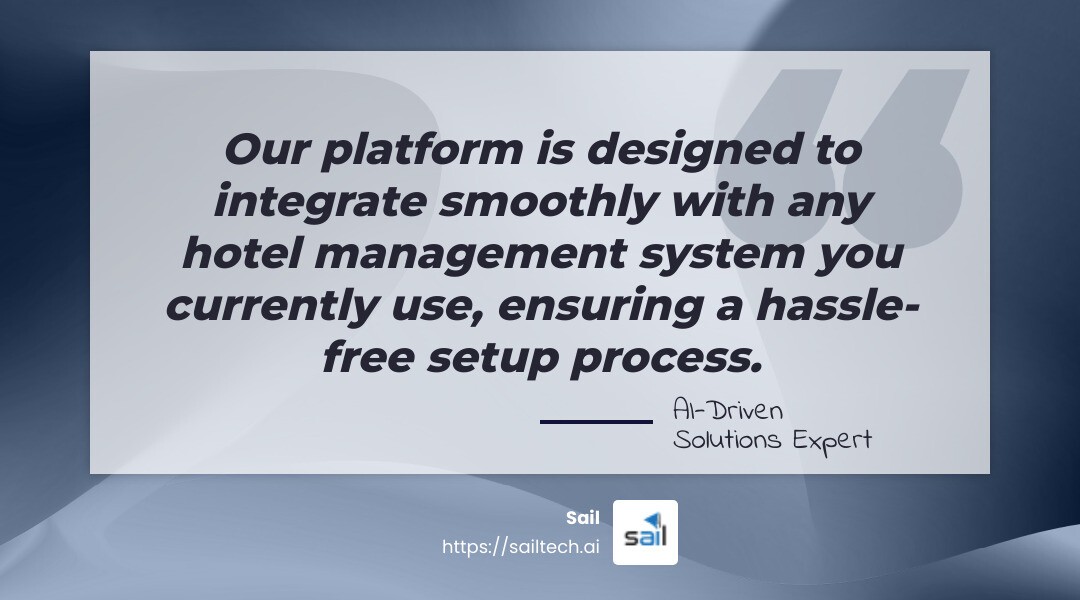Blogs /
Direct Bookings & Conversion
As travel demand evolves, hotel marketing is no longer just about visibility—it’s about being discovered where booking decisions are made. This report explores how search, social, and AI are reshaping guest acquisition.
No-commitment hotel marketing offers a solution to the challenges faced by hotels trying to succeed in today’s competitive hospitality industry. It provides a risk-free opportunity to improve visibility and boost direct bookings without the burden of long-term contracts. By focusing on results-driven strategies, hotels can engage guests effectively and reduce dependency on costly third-party platforms.
In an industry where guest loyalty is invaluable, no-commitment marketing empowers hotels to experiment with diverse strategies that resonate with their audience. Whether through social media campaigns, strategic partnerships, or SEO techniques, this approach allows hotels to tailor their marketing efforts in a way that meets their unique operational goals and grows their loyal customer base.
As the founder and CEO of Sail, I’ve dedicated my career to changing how hotels harness the power of no-commitment hotel marketing. With expertise in AI-driven solutions and a history of driving success in the hospitality space, I guide hotels in cutting costs and maximizing direct bookings, without the constraints of long-term agreements.

Understanding No-Commitment Hotel Marketing
No-commitment hotel marketing is a game-changer for hotels looking to steer the competitive hospitality landscape. It allows hotels to engage in marketing efforts without the pressure of long-term contracts. This approach focuses on flexibility and results, making it an attractive option for hotels aiming to boost direct bookings.
What is No-Commitment Marketing?
At its core, no-commitment marketing is about minimizing risk. Hotels only pay for the results they achieve, such as actual bookings, rather than upfront fees or long-term contracts. This model shifts the focus from traditional marketing expenses to performance-based outcomes, ensuring that every dollar spent contributes directly to increasing occupancy and revenue.
Why Choose a Risk-Free Model?
The hospitality industry is known for its unpredictability. A risk-free model allows hotels to adapt quickly to changes in market demand or guest preferences without being locked into rigid marketing agreements. This flexibility is crucial, especially in a post-pandemic world where trends can shift rapidly.

Boosting Direct Bookings
Direct bookings are the holy grail for hotels. They eliminate the need for third-party commissions and foster a direct relationship with guests. By using no-commitment marketing, hotels can focus their efforts on driving traffic to their own websites and increasing direct bookings. This not only improves profit margins but also enhances the guest experience by allowing for personalized communication and services.
Incorporating strategies like social media engagement, SEO optimization, and targeted email campaigns can significantly increase a hotel's direct booking rates. These tactics help hotels reach potential guests where they are most active and engaged.
In summary, the flexibility and focus on results offered by no-commitment hotel marketing make it a powerful tool for any hotel looking to improve its visibility and boost direct bookings. In the next section, we'll explore key strategies to effectively implement this marketing model.
Key Strategies for No-Commitment Marketing
To effectively leverage no-commitment hotel marketing, hotels can employ a combination of strategies that maximize reach without the burden of long-term contracts. Here are some key strategies to consider:
Social Media Engagement
Social media is a powerful tool for hotels to connect with potential guests. Platforms like Instagram, Facebook, and TikTok allow hotels to showcase their unique offerings and engage with their audience in real-time. Sharing behind-the-scenes glimpses, guest testimonials, and local attractions can captivate travelers in the dreaming phase of their journey.
Tip: Use hashtags and location tags to increase visibility and encourage user interaction by responding to comments and messages.
SEO Optimization
A strong SEO strategy is essential for improving search engine rankings and driving organic traffic to your hotel’s website. By optimizing website content and meta descriptions with relevant keywords, hotels can increase their visibility during the planning phase when travelers are actively researching accommodations.
Tip: Ensure your hotel is listed on Google My Business and encourage satisfied guests to leave positive reviews to boost your online credibility.
Strategic Partnerships
Forming partnerships with local businesses can be an effective way to increase referrals and attract guests. Collaborate with local attractions, restaurants, and event organizers to create packaged deals or cross-promotional opportunities. This can help your hotel appeal to travelers seeking comprehensive experiences.
Tip: Cross-promote your hotel’s offerings on the platforms of partnering businesses to tap into their customer base.
Email Marketing
Email marketing remains a cost-effective way to stay top-of-mind with past and potential guests. Regular newsletters or targeted campaigns highlighting last-minute specials can drive bookings from nearby travelers.
Tip: Personalize emails with guest preferences and past stay information to improve engagement and conversion rates.
User-Generated Content
Encouraging guests to share their experiences and tag your hotel on social media can generate authentic content that resonates with potential guests. User-generated content, such as guest photos and reviews, can be more persuasive than traditional advertising.
Tip: Request permission to use guest-generated content in your marketing efforts for added authenticity and trust.
By focusing on these strategies, hotels can effectively implement no-commitment marketing to improve their visibility and increase direct bookings. In the next section, we'll dig into leveraging AI-driven solutions to further optimize these efforts.
Leveraging AI-Driven Solutions
AI-driven marketing is changing how hotels attract and engage guests. By using the power of artificial intelligence, hotels can achieve seamless integration with their existing systems, making marketing efforts more efficient and cost-effective.
AI-Driven Marketing
AI technology is no longer just a buzzword; it's a game-changer in hotel marketing. With the ability to analyze 9 billion data points, AI can predict guest preferences and behaviors, allowing for highly targeted and personalized marketing campaigns. This level of precision ensures that marketing messages reach the right audience at the right time, significantly boosting direct bookings.
Fact: Hotels using AI-driven solutions have seen an average increase of over 30% in direct bookings within weeks of implementing these strategies.

Seamless Integration
One of the standout features of AI-driven solutions is their ability to integrate smoothly with any hotel management system. This means hotels can start benefiting from AI-driven marketing without overhauling their existing infrastructure. This seamless integration not only simplifies the setup process but also allows hotels to maintain their operational flow while enhancing their marketing capabilities.
Quote: "Our platform is designed to integrate smoothly with any hotel management system you currently use," ensuring a hassle-free setup process.

Cost-Effectiveness
AI-driven marketing is inherently cost-effective, particularly when combined with a no-commitment marketing model. By covering ad spend and charging only for bookings generated, hotels can maximize their marketing budget without upfront costs or hidden fees. This approach makes high-quality marketing accessible to hotels of all sizes, aligning with their goals of increasing bookings and revenue.
Tip: Use AI to continually refine audience targeting and optimize ad efficiency, ensuring your marketing budget is used effectively.
By leveraging AI-driven solutions, hotels can improve their marketing strategies, ensuring they remain competitive in a rapidly evolving industry. This technology not only boosts visibility and direct bookings but also provides valuable insights into guest behaviors and preferences. Understanding how these AI-driven tools work will be crucial for any hotel looking to thrive in the modern hospitality landscape.
In the next section, we'll address some frequently asked questions about no-commitment hotel marketing and how it can be applied effectively.
Frequently Asked Questions about No-Commitment Hotel Marketing
How does hotel marketing work?
Hotel marketing is all about sending the right message to potential guests. This means understanding what your guests want and how to reach them. By using strategies like social media, SEO, and email marketing, hotels can connect with travelers looking for their next stay. The goal is to turn these connections into direct bookings, which are more profitable for hotels compared to bookings made through third-party sites.
How impactful is the marketing plan to a hotel?
A strong marketing plan is crucial in the competitive hotel industry. It helps build guest loyalty and boosts revenue. When guests feel valued and have a great experience, they are more likely to return and recommend the hotel to others. This word-of-mouth marketing is powerful and cost-effective. By focusing on the right marketing strategies, hotels can stand out from the competition and increase their bookings.
How can I market my hotel without long-term commitments?
You can market your hotel effectively without being tied down by long-term commitments. Here are some strategies:
Social Media: Use platforms like Instagram and Facebook to share engaging content and interact with guests.
SEO: Optimize your website to rank higher in search results, making it easier for travelers to find you.
Partnerships: Collaborate with local businesses to create package deals or cross-promote services.
Email Marketing: Keep in touch with past guests and send personalized offers to encourage repeat bookings.
By focusing on these no-commitment hotel marketing strategies, hotels can remain flexible and adapt to changing market trends. This approach not only saves costs but also ensures that marketing efforts are aligned with the hotel's goals of increasing visibility and direct bookings.
Conclusion
In today's competitive hotel industry, adopting a no-commitment hotel marketing approach can be a game-changer. At Sail, we offer a risk-free model that is designed to improve your hotel's visibility and drive direct bookings without the burden of long-term commitments.
Our AI-driven marketing solutions allow hotels to be featured prominently on platforms like Instagram, Metasearch, and Google. This ensures maximum exposure to potential guests, a crucial factor in increasing bookings and revenue. By covering all ad spend upfront, we eliminate the financial risk for hotels, making our model both cost-effective and hassle-free.
Increased visibility is not just about being seen—it's about being seen by the right people. Our strategies are custom to target the ideal audience for your hotel, ensuring that your marketing efforts convert into tangible results. With Sail, hotels have reported an average increase of over 30% in direct bookings, directly impacting their bottom line.
Embracing no-commitment hotel marketing with Sail means you can focus on what you do best: providing excellent service to your guests. Leave the marketing to us, and watch as your hotel's reputation and revenue grow.
In summary, our risk-free model empowers hotels to achieve greater success without the stress of upfront costs or long-term agreements. Join us in changing your hotel's marketing strategy and open up the potential for increased visibility and direct bookings.
Share:
20 years of hospitality lessons. No fluff. No spam
Join 500+ hospitality pros getting our best growth playbooks.
© 2026 Sail. All rights reserved.

